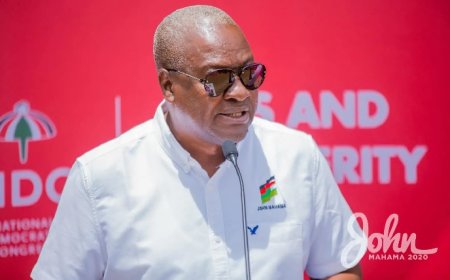Mahama’s Victory: What It Means for Ghana’s Economy, Banking Sector, and Policy Landscape
Mahama's projected victory could reshape Ghana's economy, with potential changes to banking reforms, Free SHS policy, and key national projects like the National Cathedral.

As Ghana awaits the official results of the December 7, 2024, elections, projections show former President John Dramani Mahama of the National Democratic Congress (NDC) leading with 52.7% of the vote, while Vice President Mahamudu Bawumia of the New Patriotic Party (NPP) who has conceded defeat, trails with 40.1%. This anticipated political transition could bring significant implications for the economy, the banking sector, and key national policies.
Banking Sector Reforms Under Scrutiny
One of the most contentious legacies of the outgoing NPP government is the banking sector cleanup, which resulted in the revocation of licenses of financial institutions, including banks, savings and loans companies, and microfinance firms. While the initiative aimed to stabilize Ghana’s financial sector, critics argue that it led to massive job losses and diminished confidence in local financial institutions.
Petitions have already been made to Mahama to revisit this cleanup, with calls for licence to be given back to affected financial institutions.
His administration may face pressure if not done willingly to conduct an independent review of the process to address perceived injustices. Any policy changes in this regard could influence investor confidence in the financial sector and alter the regulatory framework for banking operations.

The Free SHS Policy: A Potential Shift?
The Free Senior High School (SHS) policy, a flagship program of the NPP government, has been both celebrated and criticized. While it expanded access to secondary education, concerns about its sustainability and impact on quality have persisted. During his campaign, Mahama hinted at restructuring the program to ensure its long-term viability. Businesses operating in the education sector, including private schools and suppliers of educational materials, will closely watch how potential modifications to the policy might impact their operations.
The National Cathedral and Its Economic Implications
The construction of the National Cathedral has been another polarizing issue, with critics questioning its necessity amid Ghana’s economic crisis. Mahama’s projected win could lead to a reassessment of the project, potentially reallocating resources to more pressing economic recovery initiatives. This could signal a shift in government priorities toward infrastructure and development projects with direct economic benefits, such as industrialization and job creation, which may spur optimism among local businesses and investors.

Impact on Parliament: A Weakened NPP Majority
Early results indicate significant losses for NPP parliamentary candidates, suggesting that the party may lose its majority in Parliament. This shift could complicate legislative decision-making, as the new administration will need to negotiate with opposition members to pass key policies. Businesses and investors may face uncertainty in the short term, particularly around the approval of budgets and economic reforms.
Market Reaction and Investor Sentiment
The elections were held against the backdrop of Ghana’s worst economic crisis in decades, characterized by high inflation, unsustainable debt, and low investor confidence. Mahama’s return to power could lead to a reevaluation of Ghana’s economic trajectory, particularly in securing international financial support and restructuring debt. The market’s reaction will largely depend on the clarity and feasibility of Mahama’s economic policies, with key sectors such as banking, education, and construction poised for potential shifts.

As Ghana braces for an official announcement of the election results, businesses and investors are preparing for potential changes in policy direction. A Mahama-led government could revisit key initiatives of the outgoing administration, from the banking sector cleanup to social policies like Free SHS and national projects such as the cathedral. Combined with a likely divided Parliament, this political transition signals a complex but potentially transformative period for Ghana’s economic and policy landscape.
Source: The High Street Journal
























































